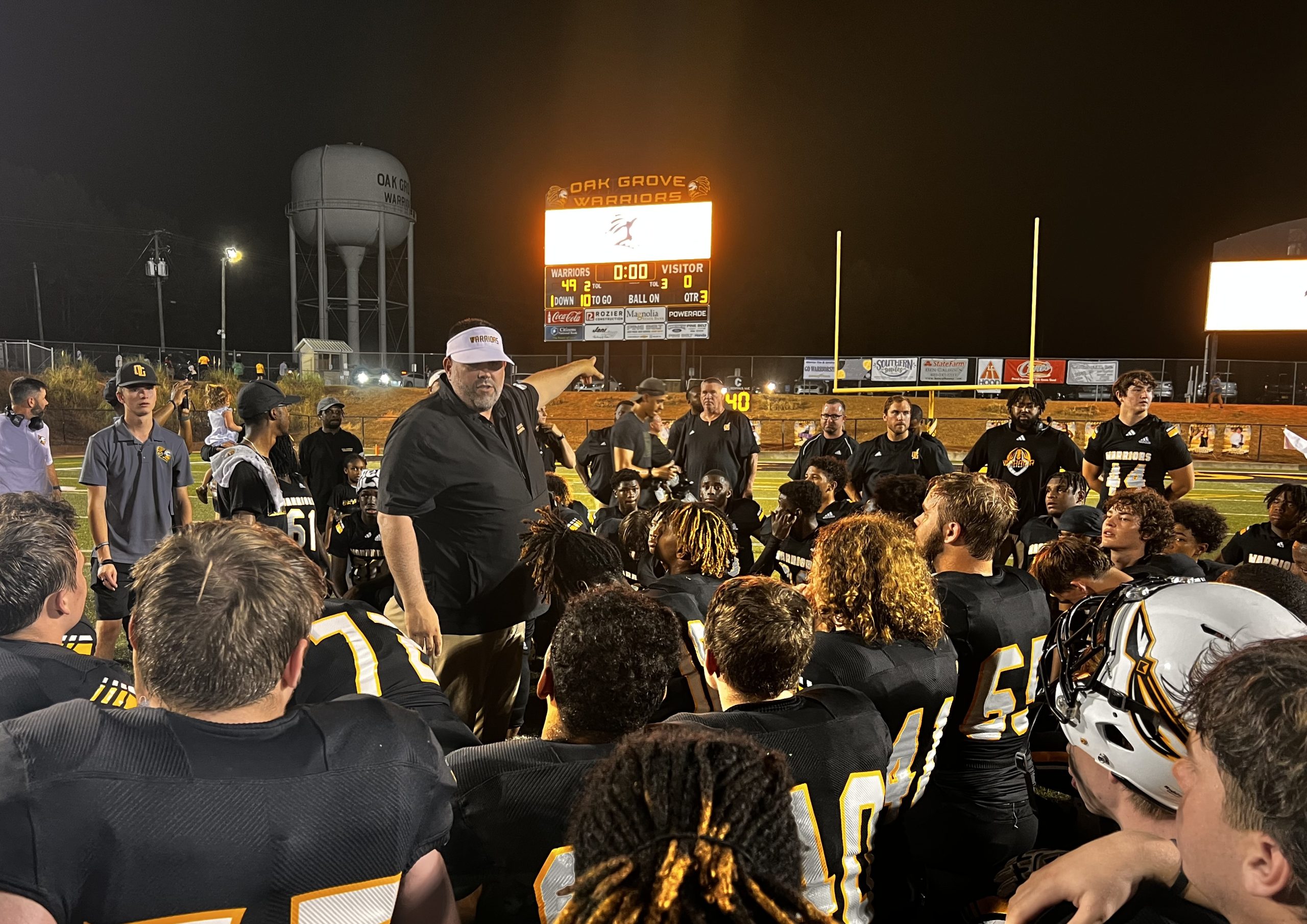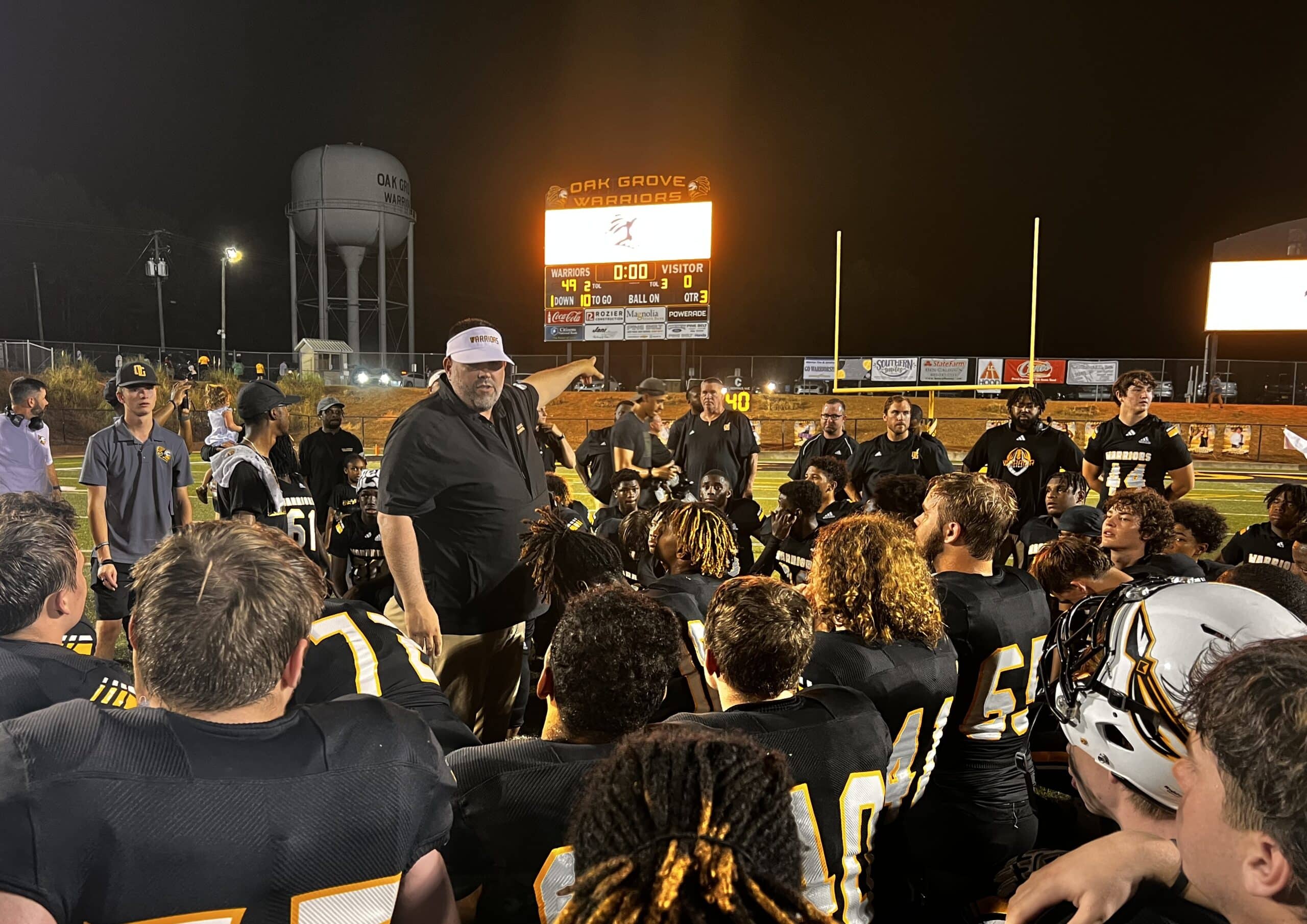Mississippi Today
Oak Grove football then and now: The transformation is astounding


Credit: Tyler Cleveland
HATTIESBURG — Back in my earliest days of sports writing, back in the dark ages, Oak Grove was a sleepy little country school, a few miles from Hattiesburg just across the Lamar County line.
The Warriors, as they were called then and now, played in the smallest classification of MHSAA football. To be nice, they were not particularly proficient at the sport. Indeed, they were often the other team’s homecoming opponent. Petal, Purvis, Bassfield and Collins were the Pine Belt’s small-town high school football powers. Oak Grove? The Hattiesburg American newspaper, for which I worked, rarely even sent a staff reporter to cover their games. We had an Oak Grove correspondent, who brought in his stories written in long-hand. He often struggled to make 35-0 defeats sound like valiant efforts.

That was then. This is now: The 2023 Oak Grove Warriors opened their season Thursday night with a resounding 49-0 victory over perennial power Wayne County. The drubbing was worse than it sounds. Oak Grove, with several big-time college prospects on display, led 42-0 at halftime and rested starters in the second half, which was played with a running clock.
This is also now: Kickoff was postponed one hour, back to 8 p.m., because of the blasphemous heat wave we are experiencing. Even so, the temperature was a humid 93 at kickoff and 84 at game’s end. There were mandatory water breaks midway through each quarter. The water boys were especially busy. Didn’t seem to bother the Warriors – or the visiting Wayne County War Eagles for that matter. I noticed one player limp off the field with cramps. Otherwise, the game was played without heat-related incident, a credit to the conditioning of both squads.
So much about high school football has changed over the decades. The players are so much larger and yet faster. The backs now are bigger than the linemen then. They throw the ball much more often. They play on plastic, not grass. The Oak Grove football stadium is double-decked on the home side. And, of course, the teams – and the stadiums – are integrated.
The westward migration of Hattiesburg into Lamar County has made Oak Grove into one of the state’s largest public schools. The Warriors play in the MHSAA’s new and largest Class 7A. Clearly, they are a force to be reckoned with, and we can measure just how good they are next Friday night when they play at Alabama powerhouse Hoover in Birmingham.
Those who haven’t followed the Oak Grove story over the last half century might ask: How did such a tiny country school become such a large school powerhouse? The migration is part of it. Mississippi Coaches Hall of Famer Nevil Barr is another. Barr, who played football at Purvis and then Southern Miss, coached at Sumrall and then Petal before taking the Oak Grove job in 2001. He instituted the spread offense back when few other high school teams were running it. His teams threw the ball over the field. All that passing and scoring coincided with Hattiesburg’s westward migration. Victories and championships followed.
Drew Causey, who played for Barr at Petal and then served him first as a line coach and then as offensive coordinator at Oak Grove, now heads the Oak Grove football juggernaut. Again, he could have named the score Thursday night against a Wayne County teams that annually is among the state’s Class 5A powers. My guess is – and I can’t confirm it – the 49-0 defeat is the most lopsided since Wayne County schools consolidated in 1988. The War Eagles aren’t nearly as bad as Oak Grove made them look Thursday night. (Last season, Oak Grove needed a last-second field goal to beat Wayne County.)
“We’ve got a really good football team, we’re excited,” Causey said. “And Wayne County’s a whole lot better than they looked tonight. They had five turnovers, we didn’t have any. They’ll win some games.”
Oak Grove has stamped itself as one of the favorites to win the first Mississippi Class 7A championship. The Warriors are loaded. Start with senior quarterback A.J. Maddox, who has committed to Texas A&M and plans to enroll there in January. Tall and muscular, he is the step-grandson of Mississippi Sports Hall of Famer Reggie Collier and has a Collier-like throwing arm. His 39-yard dart of a touchdown throw to fellow senior Damari Jefferson began the onslaught. With a lineman in his face, Maddox threw perfectly into tight coverage, a big-time throw.
A.J.’s brother, junior Andrew Maddox, already a four-star recruit, teams with Southern Miss commit Caleb Moore to give the Warriors a fearsome interior defensive line that is as dominant as you will see in high school football. They could have qualified for homestead exemption in the War Eagles’ backfield.
There is speed everywhere you look on the Oak Grove team, especially at the offensive skill positions and in the defensive secondary. As always, Causey’s team is fundamentally as sound as can be.
On top of all else, senior Oak Grove kicking specialist Luke Stewart was stupendous with both placekicks and punts. He was seven-for-seven on extra points, eight-for-eight on touchbacks on kickoffs and his breathtaking punts threatened to bring badly needed rain. Stewart will be kicking for somebody at the next level.
It was all so impressive, especially for an observer who remembers the Oak Grove of old.
This article first appeared on Mississippi Today and is republished here under a Creative Commons license.
Did you miss our previous article…
https://www.biloxinewsevents.com/?p=279959
Mississippi Today
Mississippi River flooding Vicksburg, expected to crest on Monday
Warren County Emergency Management Director John Elfer said Friday floodwaters from the Mississippi River, which have reached homes in and around Vicksburg, will likely persist until early May. Elfer estimated there areabout 15 to 20 roads underwater in the area.
“We’re about half a foot (on the river gauge) from a major flood,” he said. “But we don’t think it’s going to be like in 2011, so we can kind of manage this.”
The National Weather projects the river to crest at 49.5 feet on Monday, making it the highest peak at the Vicksburg gauge since 2020. Elfer said some residents in north Vicksburg — including at the Ford Subdivision as well as near Chickasaw Road and Hutson Street — are having to take boats to get home, adding that those who live on the unprotected side of the levee are generally prepared for flooding.



“There are a few (inundated homes), but we’ve mitigated a lot of them,” he said. “Some of the structures have been torn down or raised. There are a few people that still live on the wet side of the levee, but they kind of know what to expect. So we’re not too concerned with that.”
The river first reached flood stage in the city — 43 feet — on April 14. State officials closed Highway 465, which connects the Eagle Lake community just north of Vicksburg to Highway 61, last Friday.

Elfer said the areas impacted are mostly residential and he didn’t believe any businesses have been affected, emphasizing that downtown Vicksburg is still safe for visitors. He said Warren County has worked with the U.S. Army Corps of Engineers and the Mississippi Emergency Management Agency to secure pumps and barriers.
“Everybody thus far has been very cooperative,” he said. “We continue to tell people stay out of the flood areas, don’t drive around barricades and don’t drive around road close signs. Not only is it illegal, it’s dangerous.”
NWS projects the river to stay at flood stage in Vicksburg until May 6. The river reached its record crest of 57.1 feet in 2011.




This article first appeared on Mississippi Today and is republished here under a Creative Commons Attribution-NoDerivatives 4.0 International License.![]()
Mississippi Today
With domestic violence law, victims ‘will be a number with a purpose,’ mother says
Joslin Napier. Carlos Collins. Bailey Mae Reed.
They are among Mississippi domestic violence homicide victims whose family members carried their photos as the governor signed a bill that will establish a board to study such deaths and how to prevent them.
Tara Gandy, who lost her daughter Napier in Waynesboro in 2022, said it’s a moment she plans to tell her 5-year-old grandson about when he is old enough. Napier’s presence, in spirit, at the bill signing can be another way for her grandson to feel proud of his mother.
“(The board) will allow for my daughter and those who have already lost their lives to domestic violence … to no longer be just a number,” Gandy said. “They will be a number with a purpose.”
Family members at the April 15 private bill signing included Ashla Hudson, whose son Collins, died last year in Jackson. Grandparents Mary and Charles Reed and brother Colby Kernell attended the event in honor of Bailey Mae Reed, who died in Oxford in 2023.
Joining them were staff and board members from the Mississippi Coalition Against Domestic Violence, the statewide group that supports shelters and advocated for the passage of Senate Bill 2886 to form a Domestic Violence Facility Review Board.
The law will go into effect July 1, and the coalition hopes to partner with elected officials who will make recommendations for members to serve on the board. The coalition wants to see appointees who have frontline experience with domestic violence survivors, said Luis Montgomery, public policy specialist for the coalition.
A spokesperson from Gov. Tate Reeves’ office did not respond to a request for comment Friday.
Establishment of the board would make Mississippi the 45th state to review domestic violence fatalities.
Montgomery has worked on passing a review board bill since December 2023. After an unsuccessful effort in 2024, the coalition worked to build support and educate people about the need for such a board.
In the recent legislative session, there were House and Senate versions of the bill that unanimously passed their respective chambers. Authors of the bills are from both political parties.
The review board is tasked with reviewing a variety of documents to learn about the lead up and circumstances in which people died in domestic violence-related fatalities, near fatalities and suicides – records that can include police records, court documents, medical records and more.
From each review, trends will emerge and that information can be used for the board to make recommendations to lawmakers about how to prevent domestic violence deaths.
“This is coming at a really great time because we can really get proactive,” Montgomery said.
Without a board and data collection, advocates say it is difficult to know how many people have died or been injured in domestic-violence related incidents.
A Mississippi Today analysis found at least 300 people, including victims, abusers and collateral victims, died from domestic violence between 2020 and 2024. That analysis came from reviewing local news stories, the Gun Violence Archive, the National Gun Violence Memorial, law enforcement reports and court documents.
Some recent cases the board could review are the deaths of Collins, Napier and Reed.
In court records, prosecutors wrote that Napier, 24, faced increased violence after ending a relationship with Chance Fabian Jones. She took action, including purchasing a firearm and filing for a protective order against Jones.
Jones’s trial is set for May 12 in Wayne County. His indictment for capital murder came on the first anniversary of her death, according to court records.
Collins, 25, worked as a nurse and was from Yazoo City. His ex-boyfriend Marcus Johnson has been indicted for capital murder and shooting into Collins’ apartment. Family members say Collins had filed several restraining orders against Johnson.
Johnson was denied bond and remains in jail. His trial is scheduled for July 28 in Hinds County.
He was a Jackson police officer for eight months in 2013. Johnson was separated from the department pending disciplinary action leading up to immediate termination, but he resigned before he was fired, Jackson police confirmed to local media.
Reed, 21, was born and raised in Michigan and moved to Water Valley to live with her grandparents and help care for her cousin, according to her obituary.
Kylan Jacques Phillips was charged with first degree murder for beating Reed, according to court records. In February, the court ordered him to undergo a mental evaluation to determine if he is competent to stand trial, according to court documents.
At the bill signing, Gandy said it was bittersweet and an honor to meet the families of other domestic violence homicide victims.
“We were there knowing we are not alone, we can travel this road together and hopefully find ways to prevent and bring more awareness about domestic violence,” she said.
This article first appeared on Mississippi Today and is republished here under a Creative Commons Attribution-NoDerivatives 4.0 International License.
Mississippi Today
Court to rule on DeSoto County Senate districts with special elections looming
A federal three-judge panel will rule in coming days on how political power in northwest Mississippi will be allocated in the state Senate and whether any incumbents in the DeSoto County area might have to campaign against each other in November special elections.
The panel, comprised of all George W. Bush-appointed judges, ordered state officials last week to, again, craft a new Senate map for the area in the suburbs of Memphis. The panel has held that none of the state’s prior maps gave Black voters a realistic chance to elect candidates of their choice.
The latest map proposed by the all-Republican State Board of Election Commissioners tweaked only four Senate districts in northwest Mississippi and does not pit any incumbent senators against each other.
The state’s proposal would keep the Senate districts currently held by Sen. Michael McLendon, a Republican from Hernando and Sen. Kevin Blackwell, a Republican from Southaven, in majority-white districts.
But it makes Sen. David Parker’s district a slightly majority-Black district. Parker, a white Republican from Olive Branch, would run in a district with a 50.1% black voting-age population, according to court documents.
The proposal also maintains the district held by Sen. Reginald Jackson, a Democrat from Marks, as a majority-Black district, although it reduces the Black voting age population from 61% to 53%.
Gov. Tate Reeves, Secretary of State Michael Watson, and Attorney General Lynn Fitch comprise the State Board of Election Commissioners. Reeves and Watson voted to approve the plan. But Watson, according to meeting documents, expressed a wish that the state had more time to consider different proposals.
Fitch did not attend the meeting, but Deputy Attorney General Whitney Lipscomb attended in her place. Lipscomb voted against the map, although it is unclear why. Fitch’s office declined to comment on why she voted against the map because it involves pending litigation.
The reason for redrawing the districts is that the state chapter of the NAACP and Black voters in the state sued Mississippi officials for drawing legislative districts in a way that dilutes Black voting power.
The plaintiffs, represented by the ACLU, are likely to object to the state’s newest proposal, and they have until April 29 to file an objection with the court
The plaintiffs have put forward two alternative proposals for the area in the event the judges rule against the state’s plans.
The first option would place McLendon and Blackwell in the same district, and the other would place McLendon and Jackson in the same district.
It is unclear when the panel of judges will issue a ruling on the state’s plan, but they will not issue a ruling until the plaintiffs file their remaining court documents next week.
While the November election is roughly six months away, changing legislative districts across counties and precincts is technical work, and local election officials need time to prepare for the races.
The judges have not yet ruled on the full elections calendar, but U.S. Fifth Circuit Court of Appeals Judge Leslie Southwick said at a hearing earlier this month that the panel was committed have the elections in November.
This article first appeared on Mississippi Today and is republished here under a Creative Commons Attribution-NoDerivatives 4.0 International License.
-

 News from the South - Florida News Feed6 days ago
News from the South - Florida News Feed6 days agoJim talks with Rep. Robert Andrade about his investigation into the Hope Florida Foundation
-

 News from the South - Virginia News Feed7 days ago
News from the South - Virginia News Feed7 days agoHighs in the upper 80s Saturday, backdoor cold front will cool us down a bit on Easter Sunday
-

 News from the South - Arkansas News Feed7 days ago
News from the South - Arkansas News Feed7 days agoValerie Storm Tracker
-

 News from the South - Kentucky News Feed7 days ago
News from the South - Kentucky News Feed7 days agoU.S. Supreme Court pauses deportations under wartime law
-

 News from the South - Alabama News Feed4 days ago
News from the South - Alabama News Feed4 days agoPrayer Vigil Held for Ronald Dumas Jr., Family Continues to Pray for His Return | April 21, 2025 | N
-

 Mississippi Today5 days ago
Mississippi Today5 days ago‘Trainwreck on the horizon’: The costly pains of Mississippi’s small water and sewer systems
-

 News from the South - Texas News Feed5 days ago
News from the South - Texas News Feed5 days agoMeteorologist Chita Craft is tracking a Severe Thunderstorm Warning that's in effect now
-

 Mississippi Today7 days ago
Mississippi Today7 days agoOn this day in 1977, Alex Haley awarded Pulitzer for ‘Roots’















































